Archived Fire Damage Blog Posts
Fire Safety Tips for Every Room of the House
6/23/2022 (Permalink)
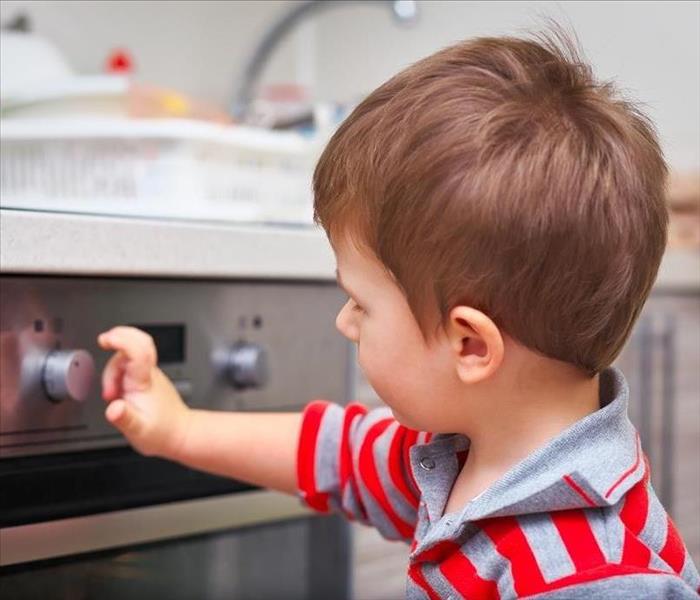 You can count on SERVPRO of Troup-Coweta Counties to help you recover after a house fire.
You can count on SERVPRO of Troup-Coweta Counties to help you recover after a house fire.
The unfortunate truth about household fires is that they can start for a myriad of reasons. From cooking incidents to improperly stored flammable items, many accidents can lead to a fire, which is why it is so vital to practice fire prevention throughout the house.
Making sure that you and every member of your household are aware of common fire hazards can help you all go about your lives with safety in mind, which drastically reduces the likelihood that you will wind up with a fire on your hands. Read on to learn about fire safety tips you should know for every room.
Kitchen Fire Safety Tips
Kitchens are the room in the home where a fire is most likely to break out, so it is extra important to be vigilant. Make sure there is nothing flammable near your stove or oven (including curtains, dish towels and potholders) and that food is never left unattended on the stove. It is also important to keep a fire extinguisher handy in case of any flare-ups, and ensure everyone in the home knows how to handle a grease fire as opposed to a regular fire.
Family Room Fire Safety Tips
While family rooms do not typically contain as many fire hazards as other areas of the home, there are still risks to consider. Don’t leave candles burning unattended, and if you have a fireplace, make sure it is inspected regularly by a certified professional. For electronics, be sure to not overload electrical outlets and replace cords and cables if they become frayed or worn out.
Garage and Storage Fire Safety Tips
Storage areas such as garages or basements can often become cluttered, which can lead to an excess of fire hazards. Make sure any flammable materials, such as lighter fluid or chemicals, are stored properly and are not able to get too hot in the summer months. Also be certain that these areas have clear and accessible exits free from clutter that could block someone’s path should they need to escape quickly.
*If you have damage to your home due to a house fire, you can count on us to help. Get in touch with us today to learn more about how our fire restoration services work.
Fire Safety Tips for the Whole Family
6/7/2022 (Permalink)
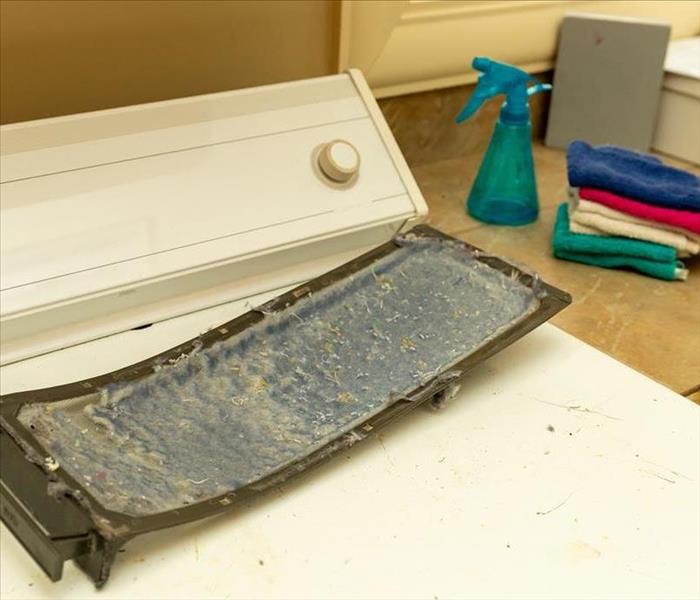 SERVPRO of Troup-Coweta is ready anytime to help with fire damage.
SERVPRO of Troup-Coweta is ready anytime to help with fire damage.
Fire safety is such an important thing for any household. House fires can be dangerous and traumatic, causing significant household damage and putting anyone in the vicinity directly in
harm’s way. Fortunately, fire safety is also a goal that the entire family can get involved with, keeping everyone more invested in safety and more prepared, just in case.
Many fire safety tips are things the entire family can participate in, which makes it a great family activity. Depending on who is in your household, it may be necessary to adjust some of these tips accordingly—for example, toddlers may have a great time drawing escape plans, while older kids may be more suited to smoke detector test duty.
However, we hope these general guidelines are helpful in getting everyone on the same page
for your home’s fire safety.
Fire Safety Tasks for Young Children
**Drawing an escape route.** Escaping quickly is key when it comes to a house fire, so an escape plan is a must. Young children can often be helpful here, drawing lines from each room
to indicate every exit.
**Being accountable for hazards.** Unattended candles, space heaters and cooking food can all be major fire hazards. Oftentimes, young children can make great safety accountability buddies,
calling out these hazards when they notice them.
Fire Safety Tasks for Older Children
**Checking smoke detectors.** Smoke detectors should be tested monthly, which can often be a great chore for preteens and teens in the home.
**Managing fire escape drills.** It is important to have a fire escape plan, and just as important to practice it regularly. Older children can be great at managing these drills, from planning them
out to debriefing as a family in order to see where there may be room for improvement.
**Cleaning out the dryer lint trap.** If your older children do their own laundry, it is important that they understand the importance of cleaning out the dryer lint trap. This is a commonly overlooked fire hazard, but the lint can heat up while the dryer is running and lead to a fire.
*If you have household damage due to a fire, we are here to help. Contact us today to learn more about our fire restoration options or get in touch 24/7 for a rapid response.
The Sights, Smells, and Sounds of Water Damage
4/20/2022 (Permalink)
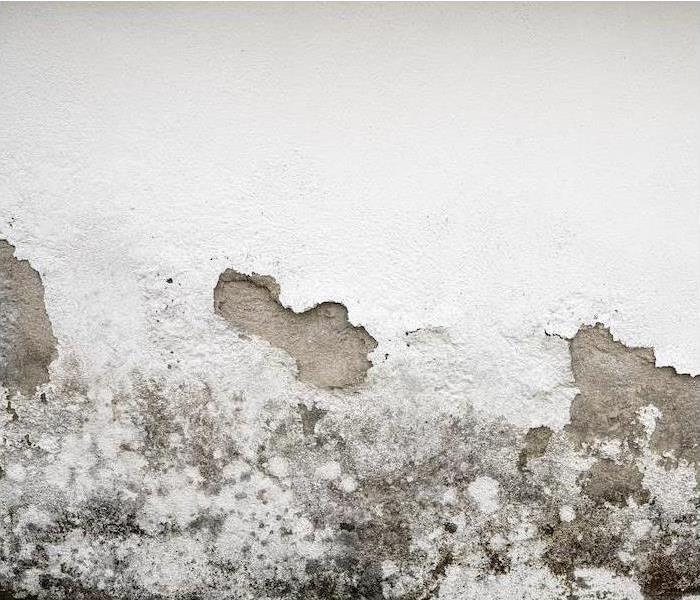 ?If you suspect water damage in your home, call SERVPRO 24 hours a day.
?If you suspect water damage in your home, call SERVPRO 24 hours a day.
Water damage can hide for a little while before revealing itself in your home, but it can only hide for so long. Depending on the type and location, it may be a matter of a few minutes, hours or days before you notice something’s going on, but eventually the water will collect itself somewhere or affect something you can’t help but notice.
Let’s look at the most common ways you can catch a leak in the act, and hopefully put a stop to it before it becomes a full-blown problem.
Spots. They call those fraud protection overlay images “watermarks” for a reason. One of the absolute telltale signs of water damage is noticing dark or wet spots on your ceiling or walls, both indicative of a leak from above. These can let you know there’s a problem on the roof or in the attic, or something happening with a pipe inside the wall.
Paint or drywall that flakes or bubbles. Paint can’t cover a water leak for long—eventually it will show in the form of cracking, bubbling or flaking. And drywall will expand, crack or otherwise fluff up as it becomes damp. (It will also weaken significantly.)
Puddles and pooling water. You clean up a puddle in the floor or under a cabinet, or you dry a wet spot in the carpet, only for it to come back. Uh oh. There’s something under there causing water to pool up and seep through.
Running water sounds. Like we said, water leaks can hide for a while before they become visible. But a keen ear in a quiet moment might help you catch something going on. Be on the listen-out for the sound of running water inside the walls when no plumbing is in use. You should also heed sounds like bubbling, gurgling or whistling from your water heater or plumbing in general.
Moldy smell. A musty, pungent odor can be a dead giveaway that moisture has gotten out of control or that water damage is evident in a basement or bathroom. If you catch that signature smell, mold is already growing and you need to take action.
Your utility bill. If your home doesn’t tell you about hidden water leaks, your utility bill may. If you notice an uptick without explanation, it could indicate a hidden leak—for example, a puncture or root invasion in an underground pipe that could lead to serious foundation problems.
If leaks lead to water damage, you’ve got a friend in the restoration community. Call SERVPRO to get yourself safely back in the dry.
Tips For Recovering After a House Fire
4/15/2022 (Permalink)
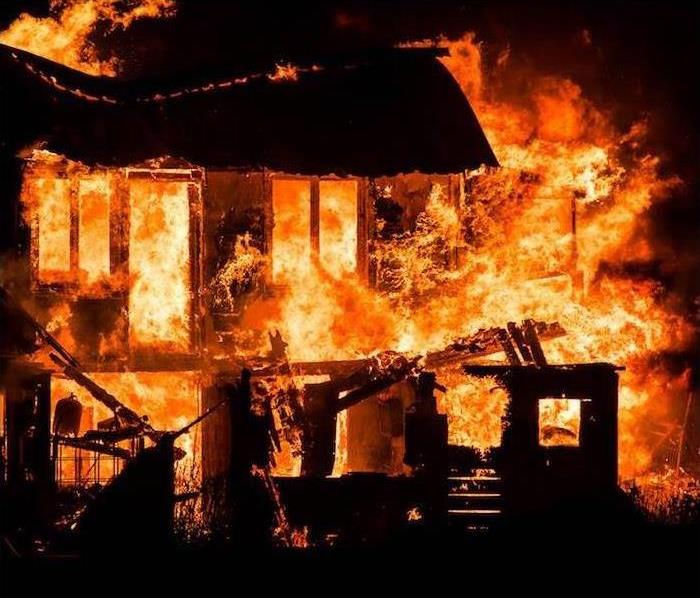 House fires trend to peak during the winter. SERVPRO of Troup-Coweta is available 24/7 in the event of an emergency.
House fires trend to peak during the winter. SERVPRO of Troup-Coweta is available 24/7 in the event of an emergency.
No one likes to think about suffering a loss like a house fire, but it’s a reality for millions of American families every year. House fires aren’t a seasonal risk to your home, but they do happen more frequently during the winter months.
If your family suffers a house fire, even one that does extensive damage, you can take steps to recover what you can from your home and recover emotionally, too. These tips can help you start the restoration process and help you deal with the aftermath of a house fire.
Taking the First Steps
The American Red Cross offers the following tips to help you in the immediate aftermath of a house fire.
After you’ve gotten everyone out of the house and treatment for any injured people or pets, then these are your next steps:
Let your loved ones know you’re safe. This is an important step, especially when news of a fire or issue can spread quickly.
Don’t go back into your home until it’s secured. The authorities will let you know when it’s safe to go back to your house. Please don’t go in there before because it can be unsafe.
Get in touch with your insurance company. You’ll want to let them know what happens to get the restoration process started.
Tips for Dealing With Emotions
It’s normal to feel a wide range of emotions after your home suffers a fire. They can range from grief to anger to depression. The American Psychological Association offers this advice to help you begin the process of recovering emotionally.
Find ways to reduce your stress. That can include exercise, meditation and deep breathing.
Don’t make major life decisions. It’s smart to avoid switching jobs or making other major choices while dealing with these complicated emotions.
Talk about your feelings. Whether you choose a therapist, family members or a close friend, it’s smart to talk to someone about what’s going on.
Don’t set expectations. There is no way you “should” be dealing with these issues. Instead, do what you can and be kind to yourself.
Take good care of yourself. Eat balanced meals and get plenty of sleep. It will help you better deal with a stressful situation.
If your home is damaged due to a fire or any other cause, you can always count on us for restoration assistance. We have crews who are available 24⁄7 in the event of an emergency. Contact us at any time to learn more about our restoration services and how we can help.
SERVPRO's Process for Fire Restoration
4/2/2022 (Permalink)
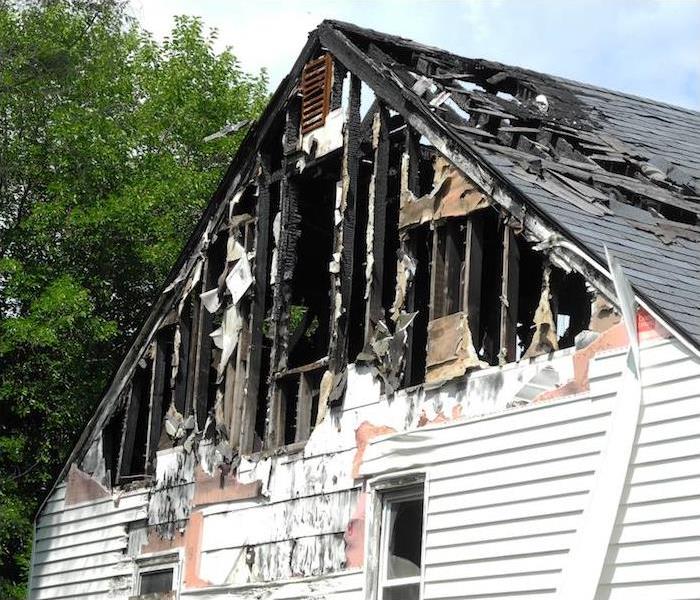 When your home or business endures fire damage, you can count on SERVPRO of Troup-Coweta from start to finish.
When your home or business endures fire damage, you can count on SERVPRO of Troup-Coweta from start to finish.
After a fire strikes your home or business, you’re left with damage from the fire as well as water saturating everything from the firefighting efforts. None of that would be a surprise to our experts here at SERVPRO, as we have the specialized fire restoration expertise to return your house to its pre-fire state.
Every fire damage situation is unique and necessitates a unique remedy, but the overall procedure remains the same. The following is how we will handle a “normal” fire damage situation.
Initial contact. We are on call 24 hours a day and seven days a week, including all holidays. Disaster doesn’t wait for office hours to strike, and we don’t wait to respond. When you contact us, the restoration procedure starts. Our experts will ask a number of questions about the fire damage so that we can get started immediately with the necessary equipment and resources.
Inspection. To establish the degree of the fire, water, smoke and soot damage, we will thoroughly check and test every room. By doing this, we are able to formulate the proper strategy. Fires can cause the air quality to be unsafe, so it’s important not to re-enter the property until experts have determined it is safe to do so.
Water removal. If there is water damage present as a result of firefighting efforts or sprinkler systems, we will begin the water removal procedure immediately to ensure the bulk of the water is removed. If there is any remaining water, it will be removed using dehumidifiers and fans, and the drying process will begin from there.
Cleaning. SERVPRO removes smoke and soot from ceilings, walls and other surfaces using highly specialized state-of-the-art equipment and processes. We’ll clean up all of the fire-damaged items and areas that can be cleaned and repaired. We will also work to return your possessions to their pre-fire state by applying a number of cleaning processes. We can clean and restore electronics, documents, upholstery and more. We also specialize in industrial air scrubbers and fogging equipment to eliminate odors.
Restoration. If during the cleaning process we determine that certain areas of your property cannot be cleaned, we also provide comprehensive restoration and rebuilding services. Restoration and rebuilding efforts include everything from modest repairs like drywall replacement, painting or carpet installation to substantial repairs like the complete rebuilding of different areas or rooms in your home or property.
When your home or business endures fire damage, you can trust that SERVPRO of Troup-Coweta Counties will be ready to be a helping hand and will get your home restored quickly and thoroughly to its pre-fire condition.
A Guide to Fire Code Considerations for Your Commercial Space
4/2/2022 (Permalink)
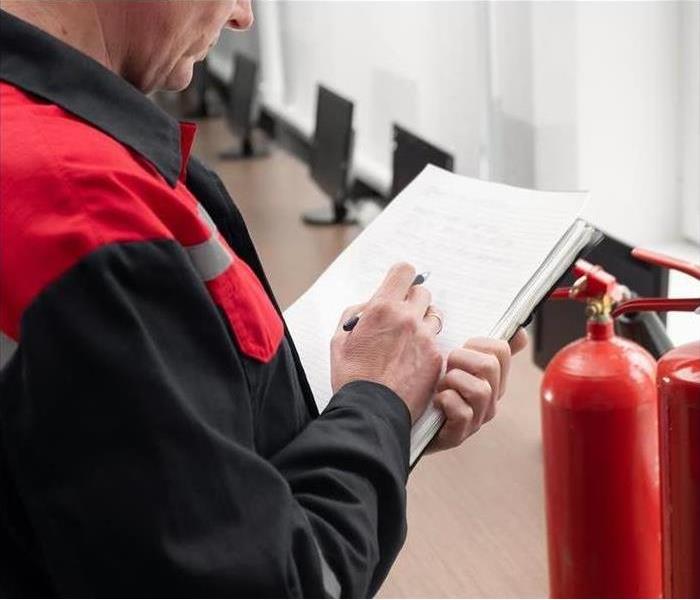 If your business needs help with fire damage, you can count on SERVPRO of Troup-Coweta 24/7/365.
If your business needs help with fire damage, you can count on SERVPRO of Troup-Coweta 24/7/365.
If you own or operate a business or other commercial space, understanding how to protect your investment and your employees from harm related to fire damage is a must. Not only are fires extremely dangerous for anyone who is in the area, but they can also be devastating to businesses—it is estimated that over half of businesses are unable to recover from a fire.
Fortunately, businesses are able to take many precautions when it comes to fire prevention, and national commercial fire codes are a great place to start. While each area will have their own local codes that should also be followed, below, we will examine some of the national codes that can help you keep your business safe and operational.
Fire Codes Pertaining to Commercial Sprinkler Systems
While they are not required in all types of commercial buildings, a commercial fire sprinkler system can be a fantastic way to reduce the risk of a fire severely impacting your business. Typically, the rules for fire sprinkler systems are that they must be installed in any commercial building over 5,000 square feet and any building that is taller than 55 feet in height.
Fire Codes Pertaining to Fire Alarms
While smaller commercial spaces are not always required to have a fire alarm system, installing them is a simple enough process that it is always a good idea. By alerting people to the fire quickly, your employees and customers will have more time to escape, which could potentially save a life. If possible, it is best to invest in interconnected fire alarms, so that when one is triggered, they will all sound to alert everyone in the area.
Fire Codes Pertaining to Fire Extinguishers
All businesses are required to have fire extinguishers on the premises, but how many and where they should be located varies based on the size and nature of the commercial space in question. Additionally, business owners are required to have fire extinguisher training with all employees at least once per year to be certain that everyone is aware of how to use a fire extinguisher and comfortable with the best practices.
If your business needs help with fire damage, you can count on us. We are here 24 hours a day to help you recover in the aftermath of a commercial fire. Contact us today to learn more.
Keeping Track of Fire Safety at Your Business
3/25/2022 (Permalink)
 If you are dealing with the aftermath of a fire at your business, you can depend on SERVPRO of Troup-Coweta.
If you are dealing with the aftermath of a fire at your business, you can depend on SERVPRO of Troup-Coweta.
For business owners, there are few things more important for the safety of you and your staff than ensuring you have the right fire protections in place. Fires can be absolutely devastating for businesses, with over half never being able to recover after the damage—but fortunately, there are plenty of ways to decrease the likelihood that you will ever experience a fire at all.
All businesses are subjected to certain fire codes set forth by the National Fire Protection Association, which provide a great guideline for making sure you are being as safe as possible. In addition to adhering to fire codes when you are first starting out, it is also important to make sure you are regularly auditing your fire safety efforts to be sure nothing slips through the cracks. Below, we have listed out some helpful tips for doing just that.
Keeping Track of Your Fire Prevention Efforts in the Workplace
Make sure you have enough (working) fire extinguishers. It is required that all commercial spaces have fire extinguishers on the premises, though how many and where they are located will vary depending on your specific situation. That being said, it is important to check your fire extinguishers regularly—while they do have a long shelf life, there will be an indicator on each one that will let you know if it is time to be replaced.
Check or install commercial sprinkler systems. While not every business is required to have a sprinkler system, they can be a great investment for any commercial space. Sprinkler systems are extremely effective at stopping fires quickly, so even if your business is not technically required by codes to have them, it might be worth considering having a sprinkler of some sort put into place.
Be sure you are reviewing fire safety with your staff. Fire safety efforts are great, but if your staff is ill-prepared for a fire, they can be all for naught. Make sure you are regularly going over fire routes, fire exits, evacuation protocols and fire extinguisher use with your staff. That way, everyone will know exactly how to take action in the event that a fire begins, which can eliminate confusion in a panicking situation.
If you are dealing with the aftermath of a fire at your business, you can depend on us. Contact us today to learn more about our fire restoration services.
Why You Should Trust SERVPRO with Your Fire Damage Recovery
3/16/2022 (Permalink)
 ERVPRO of Troup-Coweta is your local fire restoration expert. No job is too big for our team of experts.
ERVPRO of Troup-Coweta is your local fire restoration expert. No job is too big for our team of experts.
Dealing with a fire is one of the most taxing things a homeowner could possibly imagine.
Fire causes all kinds of damage in your home, and recovering from a home fire encompasses dealing with physical, financial, emotional and mental recovery.
While SERVPRO of Troup-Coweta can’t help with all these areas, we can be your main source of property recovery and restoration. And we can get your home taken care of quickly, which can in turn aid in your emotional recovery as well.
Here’s why you know you can feel good about entrusting your fire recovery to us.
We’re Established.
We’ve been doing this a very long time. SERVPRO was established the same year Thurgood Marshall was appointed to the Supreme Court, if that gives you any idea.
That means we’ve got over 50 years’ experience helping families and homeowners deal with the effects of fire, and we’ll use all those years of innovation and experience to give you the most complete recovery possible.
We’re Skilled.
SERVPRO of Troup-Coweta employs a team of experts, trained and equipped to handle anything fire may have done to your home. From reversing the effects of smoke damage to full-blown rebuilding efforts, we have the tools and work ethic to get it done.
We’re always up to date on the latest technologies, innovations and certifications, which multiplies our capacity for tackling even the toughest recovery projects.
We’re Very Fast.
When you click this link or call 770-253-8972, you’re getting connected with a local team who can be onsite right away to get started.
You don’t have to wait for a team from somewhere else to get to you—no, we’re right here in Coweta which means when you need us, we’re the quickest option for your recovery. And we’re on call 24 hours a day, seven days a week to take your emergency call.
When fire strikes at home, the choice is clear: SERVPRO of Troup-Coweta Counties is the name you can trust with your recovery and restoration.
If fire or other disasters do damage to your home, we’re here to make things right again. Contact us today to get fast, local recovery started on your property right away.
Fire Safety & HVAC Maintenance
3/3/2022 (Permalink)
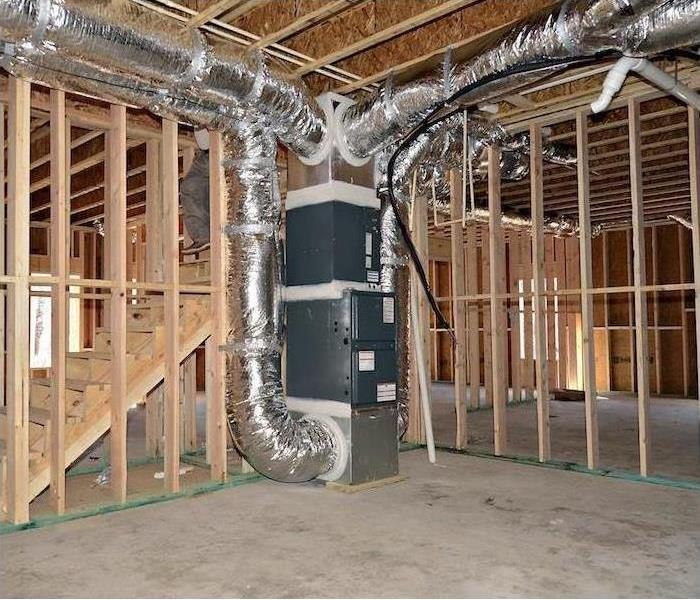 If fire should become a problem, contact the pros in green, SERVPRO of Troup-Coweta.
If fire should become a problem, contact the pros in green, SERVPRO of Troup-Coweta.
Being a responsible homeowner means taking care of the things that take care of you. Your HVAC system is always there, and there are few (if any) days per year in our area where you aren’t relying on it to keep your home comfortable. It often goes unappreciated—that is, until something goes south or stops working.
There are also some important fire safety concerns of which you need to remain aware, particularly as winter comes in and your HVAC switches to heating mode. Don’t let your source of comfort turn into a source of disaster.
Here’s what you need to do to make sure your HVAC system and furnace are running safely this fall and winter.
Routine Maintenance
Ideally, your HVAC system should be checked twice a year for any present or upcoming issues. A professional can see problems coming and head them off before any danger is presented.
Things like aging or fraying wiring can become fire hazards that are exacerbated by the extended use of HVAC systems during less pleasant times of the year.
Duct System Circulation
Overworked heating systems are dangerous heating systems, and one thing that can quickly cause your system to work too hard is allowing your ductwork to become or remain clogged. Poor circulation or ventilation can cause your furnace to overheat.
It’s recommended that you have your duct work cleaned every three to five years, and we can help with that.
Declutter Your Furnace Area
If your furnace is located in a designated area, or it’s in the corner of a basement or garage, make sure the two-foot radius around it is clear of clutter. Radiating heat (and certainly direct contact) from the furnace can cause flammable materials to ignite. Resist the urge to use your furnace area for storage.
Install Carbon Monoxide Detectors
If your furnace is gas-powered, carbon monoxide detectors can be as important for you as smoke alarms. The gas in your furnace is odorless, and you may not notice a leak until it’s too late. A detector can give you the assurance that things are running smoothly.
In addition to your regular fall maintenance, make sure to have your heating unit examined to give yourself a comfortable, fire-safe fall and winter season.
If fire should become a problem at home, we can help you with restoration and recovery. Contact SERVPRO to get the pros in green working for you right away.
A Fire Safety Checklist for Your Household
2/3/2022 (Permalink)
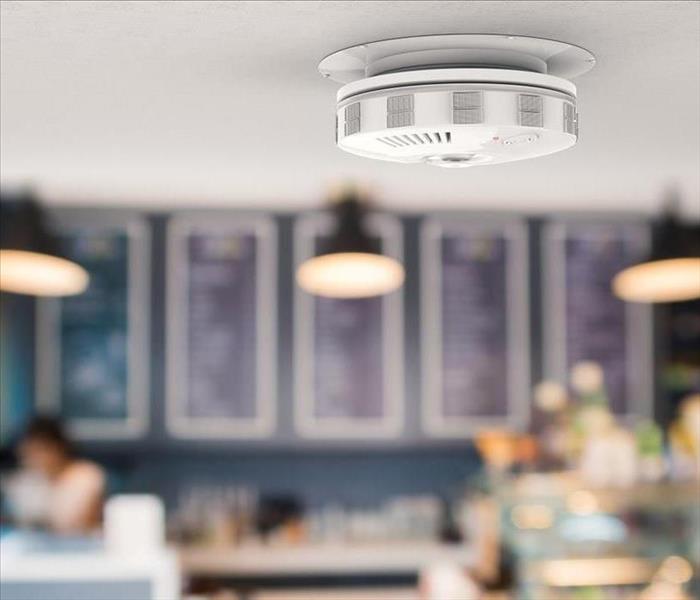 SERVPRO of Troup-Coweta is on standby to help you create your Emergency Ready Plan.
SERVPRO of Troup-Coweta is on standby to help you create your Emergency Ready Plan.
It is important for any household to practice fire safety as a regular part of their routine. House fires can be both devastating and dangerous, and on average, those in the household will have less than three minutes to escape should a fire begin.
Fortunately, by being vigilant about the prevention of house fires, you can reduce the likelihood of you ever having to experience one. While there is no way to completely eradicate your risk, there are plenty of steps you can take to make your home less susceptible to accidental fires breaking out.
A Checklist for Household Fire Safety
Practicing fire safety is a great way to reduce your risk of experiencing a fire at your home. By referencing this simple checklist, you can be sure you are taking necessary precautions to keep your household safe.
**Smoke Alarms**
* Ensure that you have smoke alarms on each level of the home and in every sleeping area.
* Test smoke alarms each month and replace batteries as needed.
* Note the install date for all alarms and replace after 10 years, even if they are still operational.
**Cooking Safety**
* Be sure to never leave the stove or oven on unattended.
* Keep flammable items, such as towels and wooden utensils, three feet from the stove.
* Store a fire extinguisher prominently in the kitchen.
* Understand the difference between grease fires and other types of fires, and know the methods for extinguishing each.
**General Safety**
* Be sure your household has a fire escape plan that you practice at least twice per year.
* Ensure that every area of your home has at least two exits.
* Store any flammable chemicals in accordance with their label recommendations.
* Keep matches, lighters and other flammable objects away from young children.
* Do not leave candles lit if they are unattended.
* Keep anything flammable at least three feet away from candles, space heaters or other sources of heat.
**Electrical Safety**
* Never overload electrical outlets or extension cords.
* Replace any frayed cords or wires immediately.
* Plug appliances and any heat-generating items directly into the wall, not into extension cords.
* If wall outlets ever feel warm to the touch, stop using them immediately and call an electrician.
*If you have damage from a fire, you can count on us to help. We are here 24/7 for restoration—contact us today to learn more about our processes.*
Breaking Down the Fire Tetrahedron
2/2/2022 (Permalink)
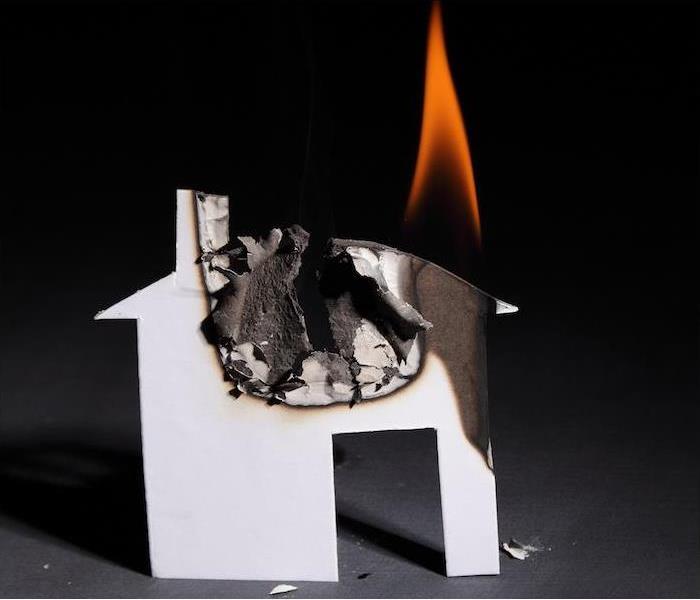 If your home or business has any damage, SERVPRO of Troup-Coweta is ready around the clock to help you recover.
If your home or business has any damage, SERVPRO of Troup-Coweta is ready around the clock to help you recover.
First things first, do you know the definition of a tetrahedron? To cut down on time, let us explain…it’s a three-dimensional, triangular shape with four equal sides.
Now that you know the basics of the geometric shape, let’s discuss what a fire tetrahedron is.
Basically, it’s a way of acknowledging that there are four components needed for fire to start—or four “sides” to the equation. If one of the sides is removed, the structure can’t stand and the fire can’t start.
The 4 Things a Fire Needs to LiveFuel. Fire, like people, needs fuel to keep going. It can be organic or inorganic, but there has to be some source of fuel for a fire to start, such as wood or plastic.
Heat. The amount of heat needed to start a fire varies from substance to substance. But you must have enough heat to cause combustion. Every object has a set point at which it will combust, melting or igniting.
Oxygen. Fire reacts with oxygen to produce a series of chemical reactions. In short, oxygen feeds the fire so that it can keep growing and generates products of combustion in the process.
Chemical Chain Reaction. The cycle of heat, fuel and oxygen combine to produce a chain reaction. This will perpetuate a fire as long as the chain reaction is undisturbed.
The 4 Ways to Stop a FireCool it. This is the most common method for extinguishing a fire, and the most common form of cooling is the application of water. Eventually, when dousing the flames with water, they reach a temperature below what’s needed to sustain a fire.
Smother it. If a fire doesn’t have access to oxygen, then it can’t live. To smother it, you must deprive it of oxygen. This can be a simple task like snuffing a candle, or it can be a little more difficult because it might need chemicals introduced.
Starve it. When a fire burns with no outside interference, it will likely burn until it runs out of adequate fuel. To be proactive, you should remove the fuel source while the fire is still trying to consume it.
Interrupt the chain reaction. Chemical agents can effectively disrupt a chain reaction and put a fire out. One chemical agent that is very effective is halon, but it has an elevated potential for ozone depletion, making it an environmental threat.
If the fire tetrahedron makes a wreck of your home or business, we’re ready around the clock to help you recover. Contact SERVPRO anytime for fast, thorough cleanup and recovery after a fire.
Where to Start on Fire Safety Efforts for the Home
1/27/2022 (Permalink)
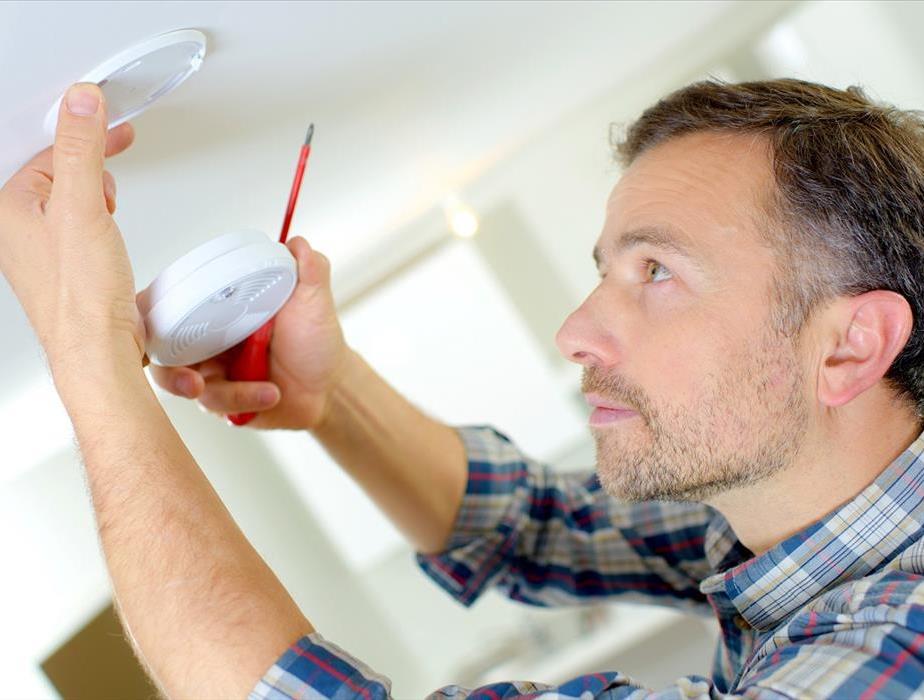 Where to Start on Fire Safety Efforts for the Home.
Where to Start on Fire Safety Efforts for the Home.
If you are hoping to improve your household fire safety, it can be overwhelming to know where to start. House fires are certainly dangerous, but given the multitude of ways they can start, understanding what fire prevention measures to take around the home can seem like it will be a daunting task.
Fortunately, fire safety is actually quite simple! By adding certain habits into your household routines, you can make major strides in reducing your likelihood of a fire and keeping your family safer.
Read on to learn more regarding where to start when improving fire safety in the home.
How to Begin Your Fire Safety Efforts at Home
**Start with your smoke alarms.** If you are new to fire safety efforts, starting with smoke alarms is really the best thing that you can do. Most people will have less than three minutes to escape when a fire begins in the home, but smoke alarms can ensure all members of your household are alerted quickly so they can begin evacuating. Make sure you have smoke alarms installed throughout each level of the home and in every sleeping area, and test them once per month to be sure they are operational and do not need a battery replacement.
**Create an escape plan.** As previously mentioned, being able to escape quickly is so important in the event of a house fire. It is wise to draft a fire escape plan for your home, and practice it with each member of your household at least every six months. Be sure that you are able to execute your plan in around two minutes, and that everyone knows where to meet up once they are safely outside.
**Consider your cooking habits.** Cooking is one of the most common causes of house fires, so evaluating your cooking habits can be a great way to prevent fires from starting. Be careful about flammable objects near the stove and leaving food unattended while cooking. Additionally, make sure that you have a fire extinguisher in the kitchen that is rated to handle cooking and grease-related fires.
*If you have damage to your home from a house fire, we are the team to call. We are here 24/7 to provide you with a rapid response. Get in touch today to learn more.
A Guide to Fire Code Considerations for Your Commercial Space
12/29/2021 (Permalink)
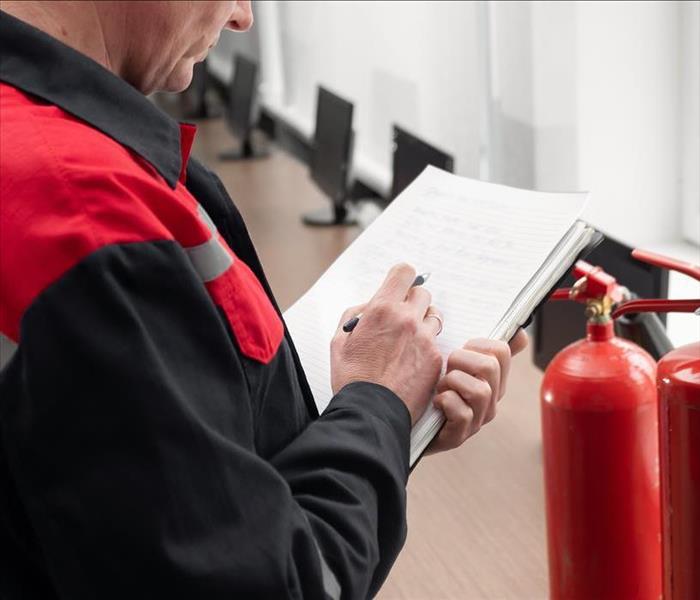 If your business needs help with fire damage, you can count on SERVPRO of Troup-Coweta Counties 24 hours a day, 7 days a week.
If your business needs help with fire damage, you can count on SERVPRO of Troup-Coweta Counties 24 hours a day, 7 days a week.
If you own or operate a business or other commercial space, understanding how to protect your investment and your employees from harm related to fire damage is a must. Not only are fires extremely dangerous for anyone who is in the area, but they can also be devastating to
businesses—it is estimated that over half of businesses are unable to recover from a fire.
Fortunately, businesses are able to take many precautions when it comes to fire prevention, and
national commercial fire codes are a great place to start. While each area will have their own
local codes that should also be followed, below, we will examine some of the national codes that
can help you keep your business safe and operational.
Fire Codes Pertaining to Commercial Sprinkler Systems
While they are not required in all types of commercial buildings, a commercial fire sprinkler
system can be a fantastic way to reduce the risk of a fire severely impacting your business. Typically, the rules for fire sprinkler systems are that they must be installed in any commercial building over 5,000 square feet and any building that is taller than 55 feet in height.
Fire Codes Pertaining to Fire Alarms
While smaller commercial spaces are not always required to have a fire alarm system, installing
them is a simple enough process that it is always a good idea. By alerting people to the fire quickly, your employees and customers will have more time to escape, which could potentially save a life. If possible, it is best to invest in interconnected fire alarms, so that when one is
triggered, they will all sound to alert everyone in the area.
Fire Codes Pertaining to Fire Extinguishers
All businesses are required to have fire extinguishers on the premises, but how many and
where they should be located varies based on the size and nature of the commercial space in
question. Additionally, business owners are required to have fire extinguisher training with all
employees at least once per year to be certain that everyone is aware of how to use a fire
extinguisher and comfortable with the best practices.
If your business needs help with fire damage, you can count on us. We are here 24 hours a
day to help you recover in the aftermath of a commercial fire. Contact us today to learn more.
Fire Safety Tips for the Holiday Season
12/20/2021 (Permalink)
 If you have a house fire this season, we are the team you can count on. We are here 24/7 to begin the restoration process.
If you have a house fire this season, we are the team you can count on. We are here 24/7 to begin the restoration process.
The holidays are such a fun time of year, filled with décor, delicious treats and plenty of cheer.
Between Christmas trees, lights on all the houses and gatherings of loved ones, there is a lot to
appreciate about this season each year.
However, while there is a lot to love about the holiday season, there is cause for concern from a
fire safety standpoint as well. The holidays bring about a change in habits and in household
items for many of us, which can lead to lurking fire hazards throughout the home. Fortunately,
many of these hazards can be avoided with a bit of prevention—read on for our top fire safety
tips for the holiday season!
Our Top Fire Safety Tips for This Holiday Season
**Be careful with your décor and decorations.** Decorating the house for the holiday season is so much fun, but it is important to be careful with what you are choosing for your home. If you like to decorate with lights, be sure to check all strands for frays or exposed wires and toss out any ones that look worn. If you like to use a real Christmas tree, be sure to water it daily—dried trees are highly flammable and can cause serious fire damage if ignited.
**Make sure to cook with care.** Making a big holiday meal or baking your favorite festive treats is a fun activity, but cooking safety is extremely important at any time of the year. If you are using the stovetop or oven, never leave it unattended, and keep anything flammable well away from heat-producing appliances in your kitchen. Additionally, it is a good time to check your kitchen’s smoke detector and fire extinguisher and replace them if necessary.
**Heat your home safely.** When there is a chill in an area of your home, a space heater can be a great way to warm things up without having to spend a fortune on your electric bill. However, space heaters can be quite a fire hazard if they are not used properly. Be sure space heaters are at least three feet from anything flammable and are equipped with tip-over sensors that will shut them off automatically if they are knocked off balance.
If you have a house fire this season, we are the team you can count on. We are here 24/7 to
begin the restoration process. Get in touch today to learn more or get a rapid response.
How to Mitigate Fire Risks Throughout Your Home
9/20/2021 (Permalink)
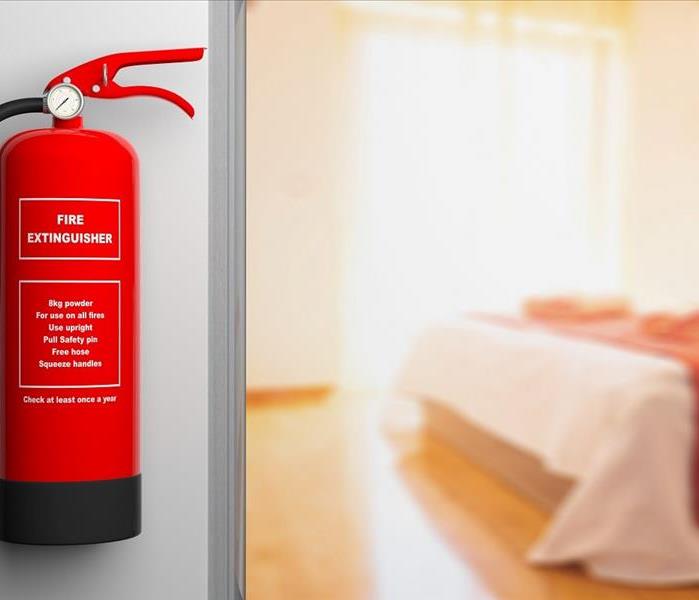 SERVPRO of Troup-Coweta Counties offers fire restoration 24/7—give us a call at any time to get a team of expert technicians out to your home quickly.
SERVPRO of Troup-Coweta Counties offers fire restoration 24/7—give us a call at any time to get a team of expert technicians out to your home quickly.
House fires are an extremely traumatic event for any family. Not only do they put those in your
household in serious danger, but they can also cause major damage to your home and
belongings inside. In regard to such a dangerous occurrence, prevention is the primary strategy
you should utilize in helping your family stay safe.
Understanding how to mitigate your household fire risk can go a long way in ensuring you do
not have to experience a fire in your home. These safety tips are key for protecting yourself and
your family while reducing the chances that a fire is going to occur at all.
Tips for Fire Safety in Your Household
Make sure everyone knows the risks. If you have multiple people in your household, it is
important to ensure that everyone understands the need to take fire safety seriously. Making
sure everyone is aware of the common dangers and prioritizes practicing fire safety throughout
their daily lives can go a long way in ensuring there are no careless errors that result in a fire.
Educating household members on simple habits, such as never leaving the stove on unattended
or always blowing candles out before leaving the room, can go a long way.
Test your smoke alarms regularly. Be sure you have smoke alarms installed in all the
recommended places and are testing your alarms at least once a month using the test function.
Smoke alarms are one of the biggest factors in alerting people in the home to a fire, and
considering you only have about two minutes to escape once a fire breaks out, getting as much
notice as possible is a must.
Install fire extinguishers throughout the home. Fire extinguishers are a great resource to
have on hand if a small fire were to start, so it is wise to stock up and put them in any high-risk
rooms you have. Keeping one in the kitchen, in the laundry room and near areas where any
flammable items are stored is a smart way to stay safe by ensuring you can quickly put out a fire if needed.
If you need help in the aftermath of a house fire, you can count on us. We offer fire restoration
24/7—give us a call at any time to get a team of expert technicians out to your home quickly.
How Grill Fires Get Out of Hand
8/29/2021 (Permalink)
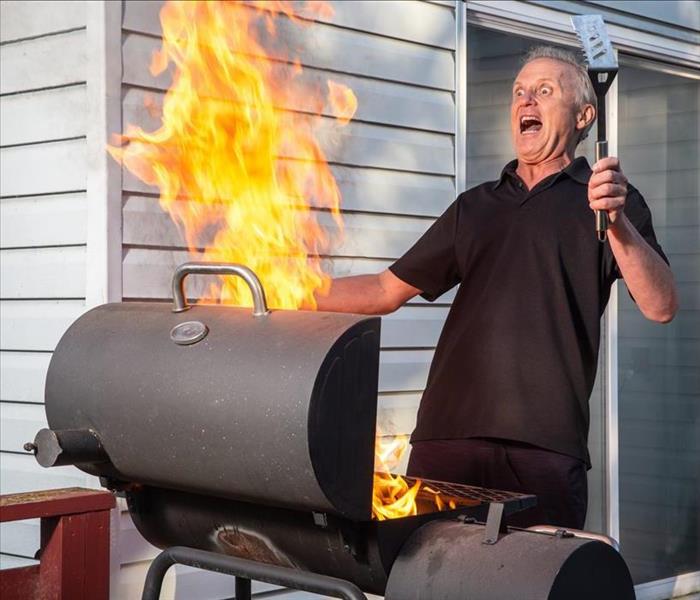 While grill fires can happen to anyone, taking the proper precautions can significantly reduce the chances that they will occur at your next cookout.
While grill fires can happen to anyone, taking the proper precautions can significantly reduce the chances that they will occur at your next cookout.
If you love to grill as much as we do, hearing about a grill fire taking place can be quite alarming. There are many reasons why grill fires can start, and they are far more common than people typically realize—the U.S. Fire Administration has found nearly 6,000 grill fires occur each year, with the most instances occurring during the summer.
While grill fires can happen to anyone, regardless of how careful they are being, taking the proper precautions can significantly reduce the chances that they will occur at your next cookout. Below, we examine the science of how these fires spread so you can consider how to best prevent them when you grill.
How Grill Fires Spread and Cause Damage
A grease fire starts due to improper cleaning. Cleaning your grill is one of the most important parts of grill owner maintenance, both because it helps your food cook better and reduces the chances that you will have a fire. If your grill grates and grease traps are not cleaned, a grease fire can start and quickly envelop your grill. You should always grill with a fire extinguisher nearby just in case, but cleaning your grill is the best step to prevention.
A flare-up ignites an object too close to the grill. Flare-ups are a normal part of grilling and they are typically not severe. Unfortunately, if you have your grill too close to a flammable object, a small flare-up can cause a disastrous fire. It is recommended you keep at least three feet around your grill empty of all flammable materials—this includes porches, siding and plants, as well as children or pets that could get injured.
An accident happened with an unattended grill. Fires can start and spread with a moment’s notice, and if your grill is unattended when one happens, you may not notice it until it has become too late. Never leaving your grill unattended is the best choice—even if you are just taking a quick break, always have someone take your place and watch it.
If your home has been damaged due to a fire, you can count on us to help you out with our proven fire restoration techniques. Learn more today and get in touch at any time of day to receive a quick response from our experienced team.
What Are Fire Tornadoes?
7/25/2021 (Permalink)
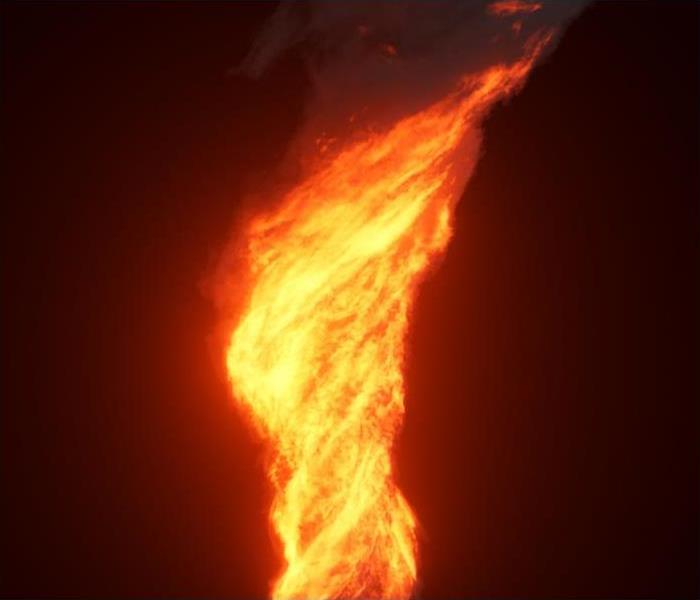 If your home or business has sustained fire damage from a fire, SERVPRO of Troup-Coweta Counties is here to restore the damage.
If your home or business has sustained fire damage from a fire, SERVPRO of Troup-Coweta Counties is here to restore the damage.
Remember when you were a kid and you would argue with your friends about who would win in a fight between Superman and Batman? Somebody would pick each side and pretend to be their favorite hero—“I’ve got Kryptonite, dude; no way you’re beating me.”
And eventually some genius would get the brilliant idea to combine the two comic book legends into one unbeatable, unstoppable force—and SuperBatman was born.
Our minds are fascinated by the thought of combining some of the most powerful things we can think of, to imagine new limits of what might be possible. It’s probably for this reason that the term “fire tornado” has such mystique. Each of those scenarios separately are enough to make one shudder, but combine them and the concept becomes truly magnificent.
A fire tornado, also called a pyrogenetic tornado, is defined by the U.S. Forest Service as a “spinning vortex column of ascending hot air and gases rising from a fire and carrying aloft smoke, debris, and flame,” which means essentially what it sounds like it means—it’s a SuperBatman-level event, equal parts epic and rare.
The difference between a fire tornado and a regular tornado is that while tornadoes form from the sky downward to the earth, fire tornadoes form on the ground and climb skyward.
In fact, it may be more accurate to think of the event as a tornadic fire—it’s the heat of the fire that causes the tornado, as hot air flows upward, air rushes in from the sides to fill the space and wind shear from different directions creates the rotation.
We are still learning about fire tornadoes, and learning to distinguish different types of events that might also be called fire whirls or firestorms. But the research we have shows they’re incredibly powerful. A fire tornado recorded in 2018 spun with the force of an EF-3 tornado, and its vortex reached an astonishing height of 17,000 feet.
They don’t always have to be massive, though. The conditions necessary for a fire tornado have been reproduced in small laboratory fires, and it’s possible you could even see one in your backyard bonfire. (No need to worry about that one reaching to the heavens.)
Fire is incredibly powerful, powerful enough to create its own localized weather system complete with cyclones and ice clouds (yeah, we didn’t even get into that part). Fire tornadoes, fascinating though they may be, are one more reminder to us that we must always respect the danger of fire in any shape or size.
If your home or business has sustained fire damage from a blaze of any nature, SERVPRO is here to restore the damage and remove soot and smoky smells. Get in touch today to get the pros on your side.




 24/7 Emergency Service
24/7 Emergency Service
















